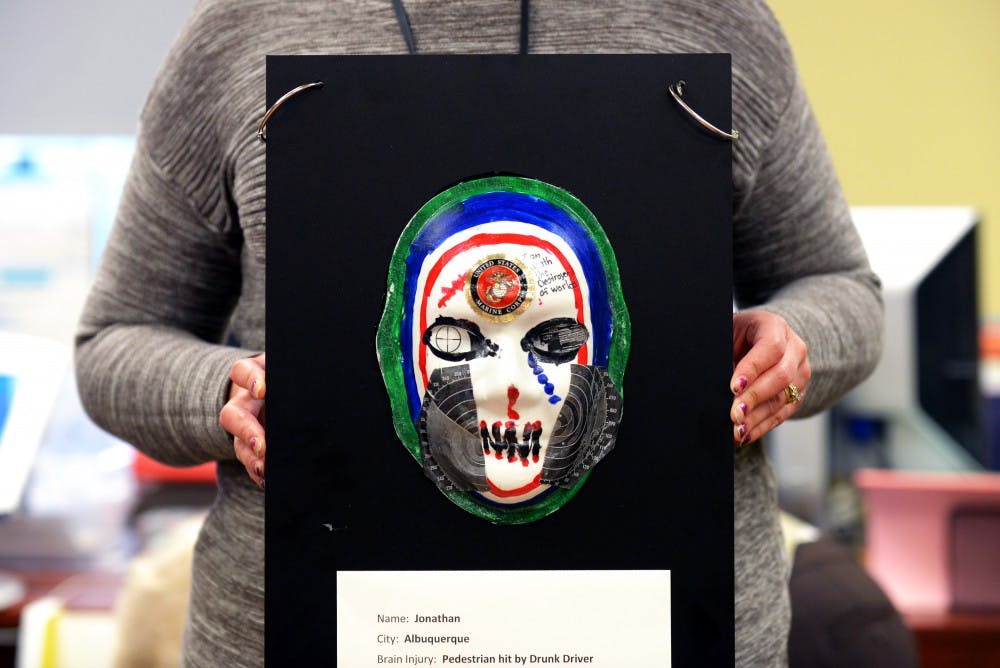The University of New Mexico’s Brain Injury Resource Center, or BIRC, held it’s first Unmasking Brain Injury event earlier this semester, meant to create awareness of brain trauma from first-hand accounts of afflicted individuals.
Janelle Torres-Groover, a health educator with BIRC, said the center held a “mask making party”, and welcomed anyone in the community who had suffered a brain injury to make a mask.
“The idea started with the Veterans Administration. They were doing this mask making project with veterans who were coming back from the war with brain injuries,” Torres-Groover said.
She said National Geographic had written an article about the project, which inspired the Brain Injury Association of North Carolina to begin their own national project.
“I saw their project at a conference that I went to in Denver, and I was just so moved that I wanted to move it here to our group, and so we did partner with them, and they did send us our first 30 masks, and then we were just able to fund the rest of it,” Torres-Groover said.
She said the masks made at UNM are featured on the national project’s website to create community awareness.
“We have stands, and we have mounted the masks and their stories to these boards, and we are going to different community events with the masks,” Torres-Groover said.
According to brainline.org, 275,000 are hospitalized in the U.S. from traumatic brain injury - which is one of two types of brain trauma, the other being acquired brain trauma - and 52,000 die from it. Primary causes of traumatic brain injury includes falls and traffic collisions, and it can increase risk for Parkinson's, Alzheimer's and other brain disorders, according to that website.
Torres-Groover BIRC's mask-making event was therapeutic for those who attended.
“I had several people say ‘you know, for the first time I really sat down and thought about my story and was able to write my story on paper and really, in a systematic way, realize everything that I’ve been through and then to be able to use different art mediums to tell that story,’” Torres-Groover said.
Gary Collins, a caretaker with Ambercare, participated in the mask-making event at UNM. Collins said he was working for Synergy Fine Wines in 2009 when he sustained acquired brain trauma.
“I used to drive all over the place and I got lazy and it showed. I weighed 300 pounds, and I had uncontrolled high blood pressure. There’s a Barnes and Noble and right behind it there’s Coors and I went down there and I have no memory for two months after that,” Collins said.
Get content from The Daily Lobo delivered to your inbox
Collins said he woke up at Ladera Physical Therapy, and later received treatment from Craig Hospital in Englewood, Colorado.
“I was given a second chance, and I am not going to blow the second chance,” Collins said.
Collins said his friend, who recently passed away and was very involved with the brain injury community, inspired his mask.
“Some people would use their masks to show how they were feeling. One lady had one that showed her being torn apart, really brutal stuff. She was in the foster system and she was abused really badly, and the mask was a way for her to get her feelings out,” Collins said.
Collins said the project is important because it spreads awareness about the challenges of dealing with brain trauma.
“Brain injury is the invisible illness, because if you didn’t know me and I didn’t tell you, you wouldn’t know,” Collins said.
Torres-Groover said the event portrayed how prevalent brain trauma is, and how it can affect anyone.
“I think that’s part of the power of the mask project, because when you really are looking at all these stories, part of the story says how you got your brain injury," she said, "and it really puts in to perspective that these people with brain injury are just like anyone else, and it can happen to anybody, anytime."
Nyla Degreff is a staff reporter at the Daily Lobo. She can be reached at news@dailylobo.com or on Twitter @Nyla_Degreff.






